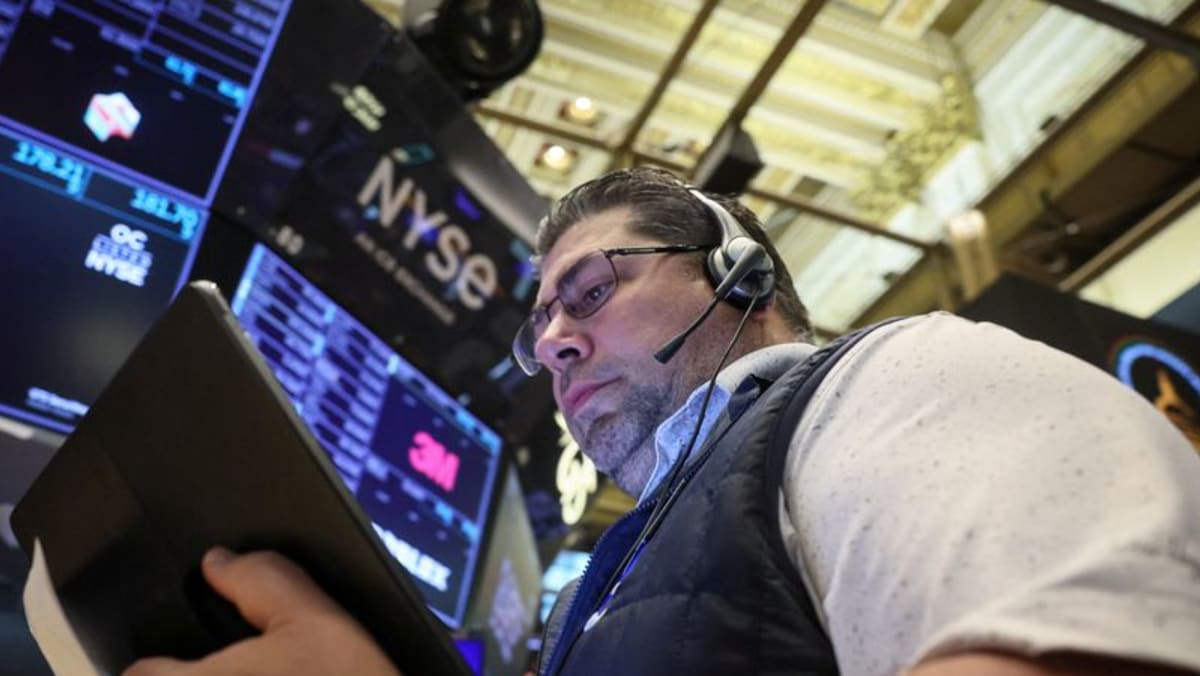NEW YORK :U.S. stocks dipped, gold surged and European stocks suffered their biggest weekly loss of the year on Friday amid cooling economic data, a hawkish Federal Reserve and unfolding political crises in Europe.
The dollar gained ground against a basket of world currencies, while the euro saw its largest Friday-to-Friday drop against the dollar in two months.
“(Regarding) the political turmoil over in Europe, we’re finally starting to see some signs of contagion,” said Michael Green, chief strategist at Simplify Asset Management in Philadelphia.
“You’re seeing risk metrics getting amped up and people are moving into risk-off assets,” Green added. “And you’re not just seeing it in the stock market.”
The S&P 500 and the Dow ended the session moderately lower while the tech-heavy Nasdaq eked out a nominal gain to reach its fifth consecutive all-time closing high.
The S&P 500 and the Nasdaq advanced on the week, with the latter nabbing its largest weekly percentage gain since late April.
The Dow looks to be headed to end the week lower than last Friday’s close.
The Fed capped its two-day monetary policy meeting with no change to its key interest rate, as expected. But in its Summary of Economic Projections, the central bank reduced the number of its projected rate cuts this year from three to one, striking a more hawkish than expected tone.
The sting was soothed by a series of economic indicators that showed inflation is cooling more quickly than analysts projected, which could convince the data-dependent Fed to reconsider the timing and number of cuts this year.
“(The Fed is) saying, ‘We plan on cutting one time,’ right? That was relatively disappointing to investors,” Green said. “At the same time, they acknowledged that the inflation progress is encouraging, and the economy is weakening. Investors are dealing with that exact same issue.”
Cleveland Fed President Loretta Mester called the recent cooling inflation data “welcome,” in the wake of the week’s CPI and PPI reports, which came in below analyst expectations, while Chicago Fed President Austan Goolsbee called the data a relief, but added that more progress is needed.
The Dow Jones Industrial Average fell 57.94 points, or 0.15 per cent, to 38,589.16, the S&P 500 lost 2.14 points, or 0.04 per cent, to 5,431.6 and the Nasdaq Composite added 21.32 points, or 0.12 per cent, to 17,688.88.
European stocks extended their broad sell-off as risk appetite was dampened by political uncertainties in France. The pan-European STOXX 600 fell 2.4 per cent on the week, its largest single-week percentage drop of 2024.
The pan-European STOXX 600 index lost 0.97 per cent and MSCI’s gauge of stocks across the globe shed 0.28 per cent.
Emerging market stocks rose 0.05 per cent. MSCI’s broadest index of Asia-Pacific shares outside Japan closed 0.16 per cent lower, while Japan’s Nikkei rose 0.24 per cent.
The dollar advanced while the euro set a course for its largest weekly drop against the dollar in two months, dragged lower by political uncertainties in France.
The yen recovered after the Bank of Japan issued a surprisingly dovish policy update.
The dollar index rose 0.31 per cent, with the euro down 0.31 per cent to $1.0702.
The Japanese yen weakened 0.16 per cent versus the greenback at 157.31 per dollar, while Sterling was last trading at $1.2685, down 0.58 per cent on the day.
U.S. Treasury yields extended their decline, edging down to their lowest level since early April as economic data provided the latest evidence of cooling inflation.
Benchmark 10-year notes last rose 8/32 in price to yield 4.2112 per cent, from 4.24 per cent late on Thursday.
The 30-year bond last rose 31/32 in price to yield 4.3442 per cent, from 4.401 per cent late on Thursday.
Oil prices inched lower but notched their best week in four months due to solid demand projections.
U.S. crude dropped 0.22 per cent to settle at $78.45 per barrel, while Brent settled at $82.62 per barrel, down 0.16 per cent on the day.
Gold prices surged and clocked their first weekly gain in four.
“There’s a lot of geopolitical uncertainty. Gold is the stable money, and a lot of central banks have been stocking up,” said Thomas Martin, senior portfolio manager at GLOBALT in Atlanta.
Spot gold added 1.3 per cent to $2,332.00 an ounce.














